Meryl Streek: An “angry, one-man operated punk band”
The Irish musician on touring, creative transformation and addressing injustice through music.
By Meryl Streek
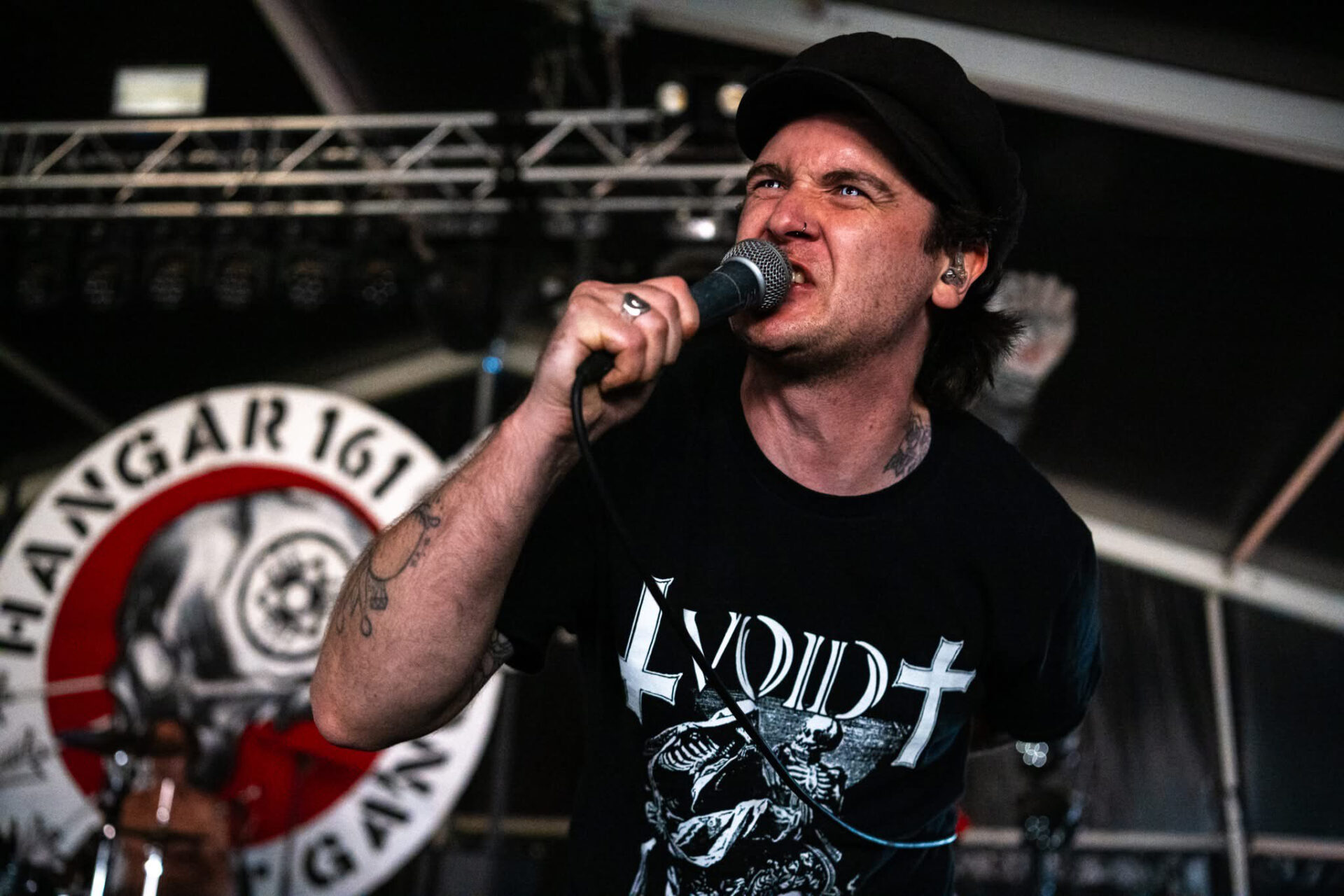
My name is Meryl Streek and I’m an angry, one-man-operated punk band from Dublin, Ireland. Having recently figured out how to make my music through [music program] Ableton, recording sessions and mixing music by myself, I’ve been flat-out learning and teaching myself more every day that goes by.
Before that, I spent 15 years of my life touring and playing in bands as a drummer for punk and psych outfits in Dublin and North America before eventually realising I was in the wrong game.
Back in 1980s Ireland, my father was in a band called Guernica. It was fronted by a singer called Joe Rooney, who later turned comedian and starred as Father Damo in Father Ted (“It’s only a bleedin’ whistle”). I remember waking up to the sound of drums coming from the downstairs living room in my granny’s house most weekend mornings. My dad was an exceptional drummer, and that’s not me saying that because he’s my dad. He was trained in a drumming school here in Dublin from a very early age alongside Larry Mullen from U2, and just had the natural rhythm built into him. When I was 10, I wanted to do the same as my dad, and I remember being taught simple rolls on the tops of tables – and the top of literally anything, to be honest. My dad was only short of playing rudiments on top of my granny’s head if he thought he’d get away with it. Naturally, it was built into me too.
My first gig was in my local community in Dublin, and I remember I was 13 with a massive mohawk. It was a family day, and everyone was eating ice cream and pretending they liked each other for the day. We had been warned previously not to play any songs with swearwords in them, but still went ahead and played a song we called the ‘Hate Song’ – the chorus being “Fuck off” spelt out over and over, which led to the gig being cut off and shut down fairly sharpish. But that was the day I got a taste for gigging and being the drummer at the back. I was soon playing in Dublin bands and making waves on the Irish scene, lugging drum cases up and down stairs, telling everyone that I was living the dream.
We got lucky one year and ended up being support to [Liam Gallagher’s former band post Oasis split] Beady Eye on their Irish tour, which was something I’ll never forget. We got three gigs with the band. I was 18 and floating on clouds for a week. Going into shops and hearing Beady Eye anywhere I went, I found it insane that I’d be playing with them soon.
I remember playing my drums and looking over and seeing Liam and Nicole Appleton (whom Liam was married to at the time) dancing at the side of the stage to our songs. He walked into our dressing room in Belfast on the last night and said, “Who’s the drummer?” I very awkwardly announced that it was me, and he replied, saying, “Top-notch drummer, maaan, top-notch drummer.” A compliment any 18-year-old aspiring drummer would kill to hear said about them.
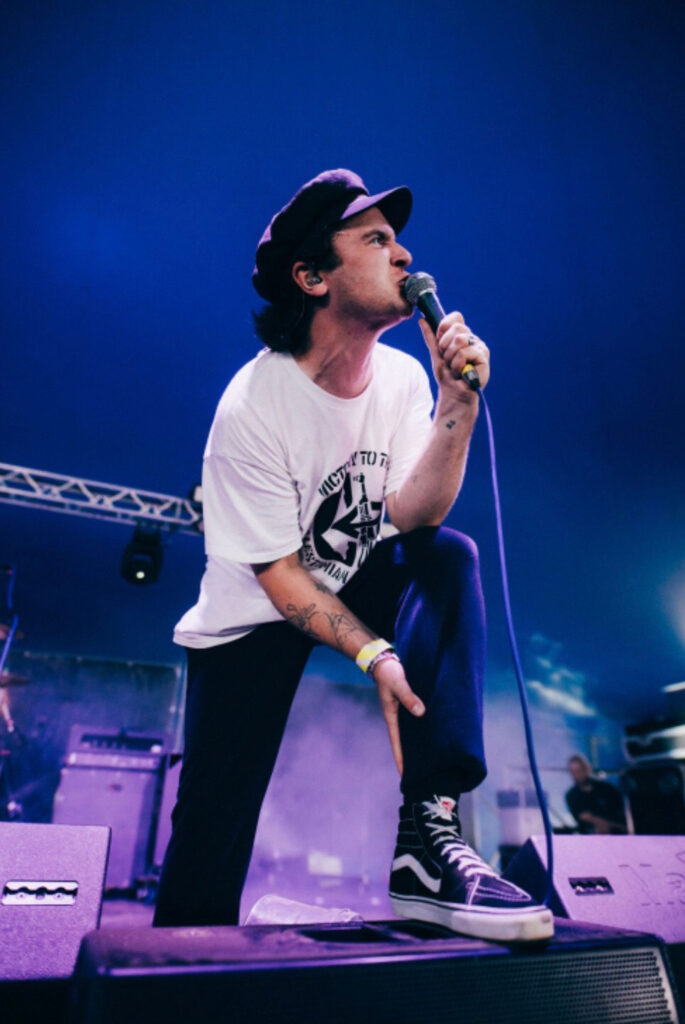
Bands come and go and split up and move on, and so did I. I ended up moving to Vancouver, Canada, for seven years of my life. I toured with a Canadian band who had all the potential in the world but eventually made a balls of it in the process. We had some great times touring the west coast of America and somehow getting the opportunity to play the Great American Music Hall in San Francisco. We played Las Vegas on that run, and I found out fairly quickly the true dangers of letting an Irishman loose in Las Vegas. It ends with your sober bass player trying to find you and the singer – 24 hours after the gig – in a casino, as we’d completely forgotten we had another gig in San Diego that day. I remember being huddled into a van, barely able to stand up straight or string a sentence together, and waking up later that day, being told I had to do another gig.
On that tour, we played the Desert Daze festival in Joshua Tree, California. It was surreal. I was standing at the side of the stage with two old mates when we saw that John Cale from The Velvet Underground was standing a few feet in front of us. Being the three Irish idiots abroad and not sober, one of my friends said out loud, “Ah, it’s Johnny Parsnip,” referring to John Cale with a vegetable-themed play on words. Cale swung around at a rapid rate and clocked me as the one who said it out loud. I was in shock as it looked like I was about to get knocked out by John Cale from The Velvet Underground.
All of these tales involve drink and other fun substances at the time. Looking back on it all, it’s provided memories that wouldn’t sound real to some, but now, being sober for over five years and touring differently, it’s two complete opposites of each other.
I tour alone now with a backpack containing some merch, a microphone, a bunch of roses, a strobe light and a laptop, and request that my rider be filled with fruit, water and a donation to a local charity. The cost of touring now, in my eyes, is all part of the plan to limit the ability of the artist so the truth can’t be spoken or a message spread.
I’ve done my time as a musician lugging equipment around for no pay, and Meryl was invented to step away from that and do something different. When lockdown happened, I was in Vancouver and as shocked as everyone else. I had just got the last flight out of Florence, Italy, coming home from a month of gigs in Europe before everything shut down for three months, so I was lucky to make it back to Canada.
I remember coming to a crossroads in life and figuring out that wearing sunglasses onstage and acting like a complete knobhead, like the majority of bands out there now do, was just the saddest thing in existence, and truthfully, most of these bands just want the fame to be able to act like that.
I decided to go sober and try to give back to people with something more genuine and so started writing songs about cases that needed attention. No rock’n’roll bullshit, just a guy in Vans and a cap telling the truth, and that’s what ya get. I bought 3oz of weed (all mixed flavours and strains) and closed the blinds in my apartment. I cut myself off from everyone and anyone who held me back, even in the slightest. After about six months of living like a hermit, I kinda woke up and realised I had no apartment, no girlfriend, no relationship and no social life anymore, but I knew I had a powerful instrumental album.
I think I was always looking for excuses to move back to Ireland, as I always wanted to be known for something in my home country, so having this album was my excuse and my reasoning for moving back from Canada. I also wanted to work with my friends in Dublin on creating the last coat of this music. I started and finished the vocals in Dublin with my mate Dan [Doherty, first producer of Fontaines D.C.], and it was the first time I’d ever heard my voice as a vocal, which I’d never practised or prepared. I simply just went into the vocal booth, nervous, with scattered pieces of paper flying everywhere, with the intention of pissing people off.
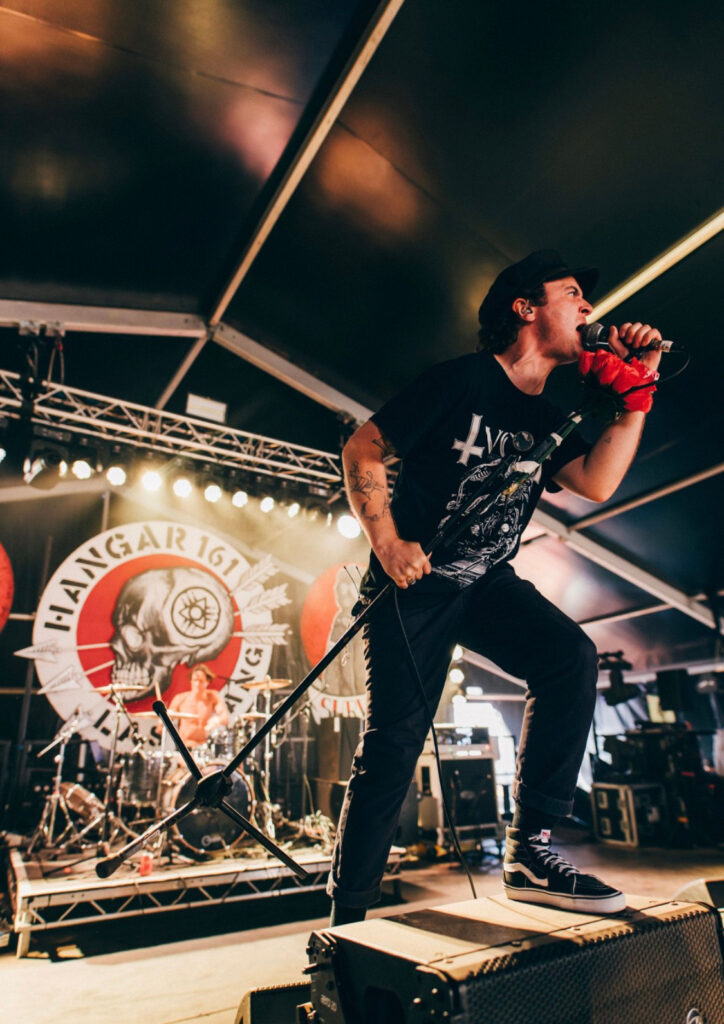
My initial plan with Meryl Streek was ‘If you can’t work with it, work against it.’ I knew I couldn’t afford a band and looked at Sleaford Mods dancing on stage and said, ‘Fuck this. I can say what I need to say to people and get my message across by buying a laptop and screaming over tracks.’ It’s gone from touring with people who wrecked my head unbelievably to having my own space and independence while on the road. The cost of the business and industry isn’t getting any better, and I wonder how bands can tour full-time, but then I remember we aren’t all as lucky to have lined pockets and major labels throwing money at us. I try to stick to the roots of DIY punk culture with a modern twist or take on the industry.
It’s still hilarious to me that people think I’m a prick – they’re not wrong, to be fair – but they’re also not fully correct either. I worked on filling the songs up with guitars and asked my friend Phil Wyer to play on some of the tracks, which helped shape them and make them sound like there’s a full band.
I shopped a demo of about 10 tracks over about two to three months, hitting up absolutely everyone, including small record labels in the UK and Ireland, getting no replies from most and replies from some of the bigger record labels around the world. I don’t think people knew what to do or how to think about this music, as even for me it was nuts to hear it for the first time – an angry Irish guy screaming over electronic music about wanting to dismantle the Catholic Church.
I got a reply from someone who worked as a PR at a company called Wall of Sound PR. His name was Jamie and he replied, asking had I heard of Venn Records? I said no, but asked for more info. He informed me that it was a label run by Laurent Bernard, guitarist for Gallows, a band I grew up loving. Straight away, the connection made sense to me.
Fast-forward a few months, and in 2022, my album 796 was scheduled for release and the excitement was real. ‘Death to the Landlord’ was the last single to come out from the album and it came out during a very important week in Ireland with one of our politicians making headlines about a collection of unlisted properties he was caught “forgetting” to declare his taxes on and charging an extortionate rent to families who lived within them. It was exactly what the song was written about, and it was ignored across the board. Politicians in Ireland breaking the law and nobody giving a shit – what’s new? Nobody in Ireland seemed to have any balls or wanted to try to rock the boat at all. The radio and media are all rigged and working for these clowns and that’s the way it goes. I was never meant to play live shows as Meryl, but I felt like I had to with the growing momentum leading up to the album’s release.
I was approached by a brilliant group of Irish activists housing Irish and Ukrainian refugees and anyone who needed help in a gigantic derelict building in Dublin. They were being kept warm, fed and educated, with it all run by volunteers. It was a sight to see. They asked if I would play a gig with a few other bands to raise some money to keep it going. I remember panicking because this was me as a singer and no longer a drummer with a band. This was real. But I said yes.
I think I had a week to prepare, and I rehearsed a little bit, going over lyrics. I arrived at the building, and seeing this situation up close made the gig all that more real. Tents were everywhere. That hit of realism reminded me how much this current government has done wrong. It was really sad. I did a 20-minute set that wasn’t much different from what I’m doing today. I was angry. Very angry. I remember celebrating my first gig as a “singer” by smoking my first cigarette in about six months.
I woke up the next day to see my name spelled incorrectly in a national Irish newspaper as “Meryl Streak”, basically calling me a criminal for breaking and entering to perform on the night. Three weeks later, the families being housed got booted back onto the street. No mention about the great work these activists achieved, the people they helped and housed, or the money that was raised. Three years later, the building remains vacant and derelict.
After this, the album came out into the world and was celebrated with a sold-out Dublin gig that saw people from Poland, the UK, Germany and the Czech Republic fly in to attend. It was honestly crazy – I never expected it. Even more crazy, the records were selling out. I’d done something in my life I knew I’d die happy about. I always wanted this to be a recording project, but after the album came out, I was flat-out with gig offers and selling out my own small club shows, which again was crazy to me considering I called most people twats on the record.
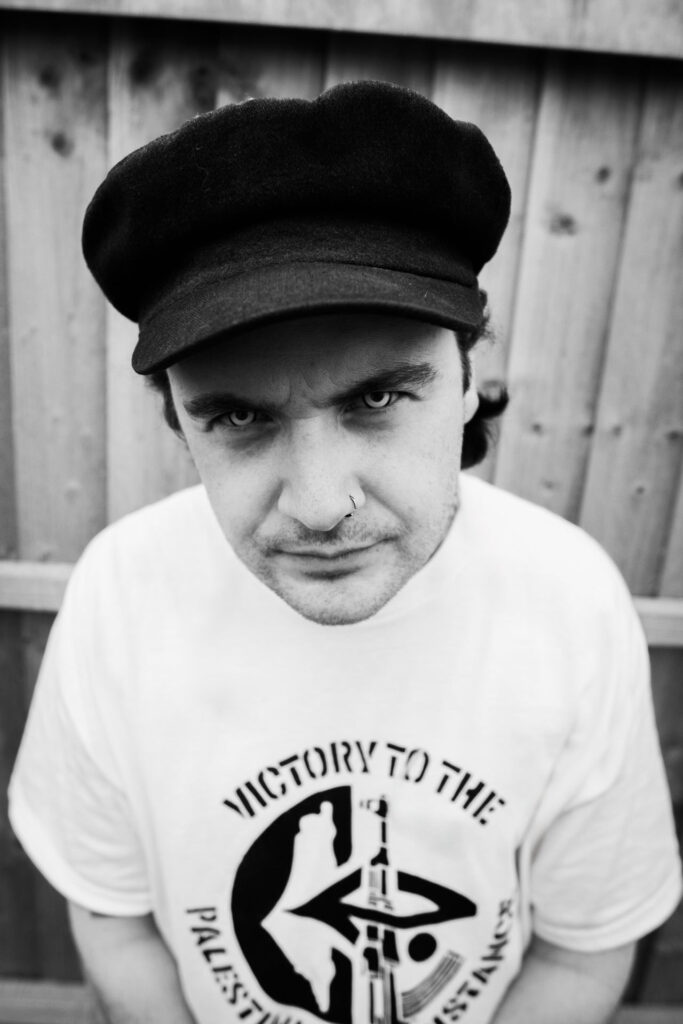
This project got a lot of attention when it started, and with that came full tours and gigs with the likes of Kneecap, Public Image Limited, Bob Vylan, Enter Shikari, and Dead Kennedys. I also tell the same stories when asked about Meryl, and to shorten it to one sentence, I went from playing a charity fundraiser in Dublin for less than 100 people to supporting my dad’s hero in life, Johnny Rotten, two years later. Considering I do most of this in his memory, I feel I’ve accomplished a good chunk of what I set out to do.
I released a second record late last year called Songs for the Deceased, which was essentially telling stories about people who were no longer with us in life that needed highlighting. One of the cases was about a young lad called Terence Wheelock who found himself in police custody wrongfully accused of a crime he never committed. According to the Irish Garda, he was discovered hours after his arrest having committed suicide in his cell. He died in hospital after being in a coma for over three months. His family, who believe he was a victim of police brutality, are still fighting to have the case reopened 20 years later – to no avail. Bits of press like this are the only support they get, and that’s why the song was written.
The album features Oliver Ackermann from one of my favourite bands, A Place to Bury Strangers, along with Kingsley Hall from Benefits, Cal Graham from The Chisel and my usual collaborators, Phil Wyer and Molly Vulpyne. To my absolute shock, the album officially charted in the UK and hit home for a lot of people who understood the record and had similar experiences to some of the content and stories told throughout. It’s not an easy listen but with bands nowadays glorifying an alcohol, drugs and gambling-fuelled lifestyle, I’d like to raise the bar on that and call them all morons and remind the younger generation of the damage that these now socially acceptable problems eventually cause down the line.
The beauty about this project is you either get it, or you don’t. Generally, the ones paying off a half-million mortgage on a mediocre property for the rest of their lives are the ones who won’t want to acknowledge the bleakness in today’s housing market and society. The families who are struggling and dealing with real-life issues every day – whether it’s landlords charging extortionate rent to low-income families, to the rising cost of living, evictions happening across the country, or just working a shit nine-to-five job while being treated unfairly and getting minimum wage – this music is for you. It seems to give people 40 minutes of feeling like they are heard, and that it’s OK to be angry in today’s day and age.
Today, I sit here finishing off a brand-new batch of music (which will either be two new EPs or a new album), targeting the same people and the same issues – plus more, as the whole world has seemed to have lost its goddamn mind.
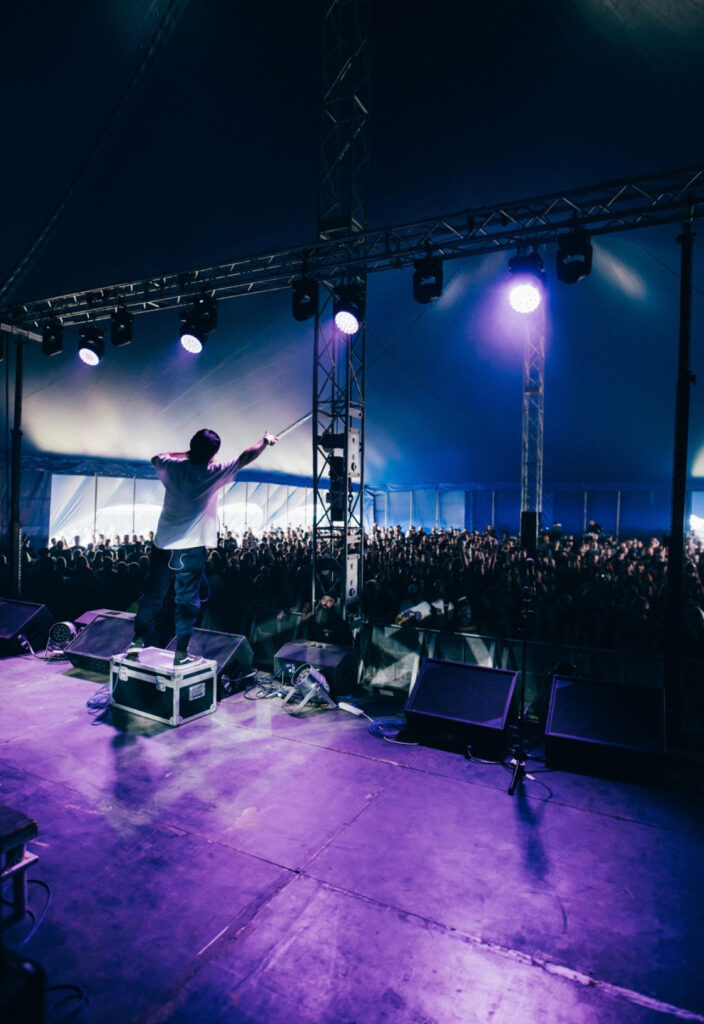
I will continue to tour and play live, with gigs and festivals booked into next year and more people to tell these stories to. Nobody should be short of writing content: all you have to do is look out of your window to see how much trouble we’re facing ahead.
To the people who don’t like politics in music: we’re in this situation because of people like you. I can see the younger generation growing up angry once they realise how blatantly snookered they have become. I can only see politics in music becoming more popular because, at this stage, it’s the only true expression we have left – everything else is rigged.
With touring getting harder, this project gives me the freedom to get my message out on a smaller, more affordable scale, and if I can convince the younger kids to wake up to what’s happening around them, then I’ll be happy with what I’ve done as Meryl Streek. Like I said before, you either get what I do, or you don’t, and that’s the beauty of it. This music doesn’t fuck about. We’ve had 50 years of the punk scene doing that; it’s time to get more real and more blunt with our messages. People want music with substance and that’s what I aim to do.
